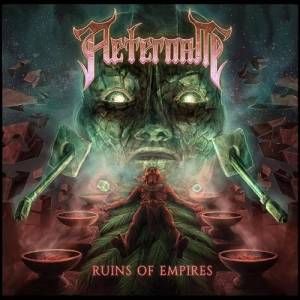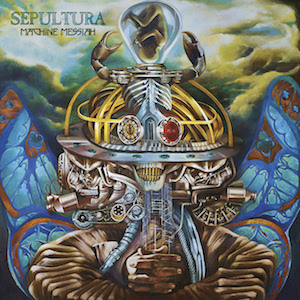Here’s a quick pair of reviews from two bands making their Metal Pigeon blog debut, an unremarkable feat I know, but it does reflect something I’ve noticed about these first eight weeks of 2017. That being that most of the new music I’ve been listening to has either been from bands I’ve never reviewed, or simply bands I’ve never heard of before. It seems like “new” is quickly becoming this year’s theme, as I’ll have a handful of reviews for relatively unknown bands coming in March when a slew of new albums are released, but for now check out a bit of what February had to offer:
 Battle Beast – Bringer of Pain:
Battle Beast – Bringer of Pain:
For as much as we (I) go on and on about how Finland is the new center of the melo-death universe and how bands such as Insomnium, Omnium Gatherum, and Amorphis are making melancholy incredibly appealing to us outsiders, its not all there is to Finnish metal. And I’m not talking about the country’s theatrical power metal vein ala Nightwish and Sonata Arctica and their forebears in Stratovarius either. There’s a third strain —- not a major one, but certainly one that’s been around long enough to warrant being identified as its own slow-growing subset, and its the sound we hear on the newest Battle Beast album, Bringer of Pain. I’m talking about this fusion of hard rock and trad metal with glam-rock roots first heard in Hanoi Rocks, The 69 Eyes (well… until recently that is when they decided they were going to be H.I.M.), Lovex, Lordi, and many others. There’s some spillover to Sweden as well, making this a partially Scandinavian phenomenon, but Finland is where it just seems to lean heavier. Normally I’m game for this vein of hard rock/metal, but I ran into a stumbling block with Battle Beast when I was first introduced to them via Dr. Metal’s Metal Meltdown show years back —- the doc was a big fan, and he promoted them often but nothing really sank in with me from what I heard on his show.
When they released 2015’s Unholy Savior, it went un-reviewed here at the blog, largely I think because I never really could figure out what the band was trying to accomplish. That’s a silly way to phrase it (they want to rock of course dammit!), but you know what I mean: One song they’re trying for epic, standing on the mountaintop power metal (“Lionheart”, “Speed and Danger”) and the next they’re writing pop-inflected cuts that felt at home on old Sandra and Berlin albums (“Touch In The Night”). I didn’t want to criticize them for being diverse, because rarely is that a negative thing, but both approaches were also quite different from the more Judas Priest-influenced straight ahead style that characterized their first two albums. In retrospect I might also have been still in full-on adoration mode for Triosphere, another Scandinavian melodic metal band with a female vocalist that had just released 2014’s Album of the Year winning The Heart of the Matter, an album that was vibrant and diverse, yet whose songs were stylistically bound together with the band’s musical and songwriting approach. In comparison, Battle Beast’s approach came across as forced and trite.
I think I was onto something there, because this same personality disorder pops up in startling ways on Bringer of Pain —- which is why I’m surprised at how I still enjoyed listening to this album despite them. It helps that the songwriting has improved in the areas that they do best. That’s a vague statement, but I hear it embodied in songs such as “Familiar Hell”, the most overtly pop-influenced song on the album and one that brings to mind a merging of Motley Crue with Roxette (practically distinct from verse to chorus!), as well as “We Will Fight” with its old-school synth lines setting that delightful 80s mood during the verses before the Warlock-esque chorus and outro riffage. Speaking of which Doro is a useful touchstone here, and vocalist Noora Louhimo channels her above all else, that raspy rock n’ roll vocal which seems born of leather, diesel fuel, and long drives across the autobahn. She exerts herself fully on “Lost In Wars”, the album’s most intriguing song with its stormy moodiness and Amorphis vocalist Tomi Joustsen’s duet guest spot alongside. There’s a few throwbacks to the Priest-driven style of Steel, as in “King For A Day” and “Bringer of Pain”, the latter of which seems to channel Painkiller almost exclusively. They’re both pretty decent rockers, but they’re distracting from the more pop-rock feel of the rest of the album (hence my psychological diagnosis for the band).
The strength of the album is indeed found in the more Roxette-ish of the cuts, namely “Straight To The Heart”, “Beyond the Burning Skies”, the aforementioned “Familiar Hell”, and the spectacular balladry of “Far From Heaven”. In short, all the songs where Louhimo is allowed to extend her femininity into her vocal performance and sharply contrast it with the brusqueness of her rock n’ roll instincts as well as the band’s knack with a gritty, catchy riff. Regarding “Far From Heaven”, you guys know I’m a sucker for ballads, particularly 80s-inspired power balladry like this, and while I get that they’re not for everyone, there’s no denying this is as awesome an ode to their glorious heyday as we’ve heard in awhile from anyone. She even gives a little R&B flair towards its final minute with improvised vocal runs, sounding all the world like Laura Branigan or Tina Turner, its an awesome moment. But here comes the personality disorder once again in “Dancing With The Beast”, a head-scratching bit of synth-pop that never really takes off on its own and just sits awkwardly adrift in the tracklisting. I’d be surprised if anyone actually enjoyed that song, and hopefully the band learns to play more to its strengths and not jump around so much stylistically on future albums. I’ll break it down in a fairly simple equation, Battle Beast at their best = Doro/Warlock + (Motley Crue x Roxette).
If you’ve already listened to the newest MSRcast, you’ll have heard my initial reaction to these guys as it was my co-host Cary who introduced me to them the night we recorded that episode. Aeternam is a four-piece from Quebec that is playing a style of metal that is commonly referred to as Oriental metal or Middle-Eastern metal, obviously more of a commentary on its sound as opposed to being solely about a band’s geographical location. As a subgenre, its small but bubbling, with leading lights Orphaned Land, Myrath, Melechesh, Khalas and Amaseffer out in front with a smattering of bands on the periphery. Typically all these bands have roots of some sort within the Middle East geographical region, but due to the difficulties of actually playing heavy music in those countries (Orphaned Land a major exception), output has been limited and most of these bands have had to relocate to Europe and North America to simply have the infrastructure to make international waves. Aeternam fall into that camp, their roots with this Oriental metal sound sourcing through vocalist/guitarist Achraf Loudiy who was born in Morocco before emigrating to Canada. From the few interviews I’ve read, he brings the cultural influences into the songwriting process that he shares with fellow members Antoine Guertin (drums) and Maxime Boucher (bass) —- how exactly all that works in the kind of detailed minutia that I’d really love to know is still unknown to me… all songs are credited to “Aeternam”, though it seems Loudiy is the key figure here.
No matter, because the influences are pretty obvious, and more importantly, their vision is surprisingly clear. Aeternam infuse basic melo-death with Behemoth-esque brutality, a Septic Flesh-ian progressiveness to their death metal, while wrapping it up in a cinematic grandeur that you’d normally associate with Therion. What’s surprising is that they actually pull this off, because as I observed aloud in the podcast, this could’ve been a total cluster$#@&. They’re unafraid of allowing melody to drive these songs, as you’ll hear on the album opener “Damascus Gate”, whose Gothenburg verses are book ended by Arabic violin melodies and feed into a convincingly strong clean vocal chorus. Loudiy is just as strong a pure singer as he is a powerful growler, recalling both Matt Heafy and Nergal respectively, and you never get the feeling that the clean vocals are forced (if they seem to have a shade less unique character than say Orphaned Land’s Kobi Farhi, well keep in mind these guys are living in North America after all). His performance on “Sun Shield” is particularly crushing on both fronts, with growling vocals that are percussive in their syncopation, energetic in their execution and setup a satisfyingly clean vocal hook.
The stuff that really makes me keep coming back to this album however are its expansive, cinematic, and often solemn moments where the cultural folk influences outshine the metal surrounding them. On “The Keeper of Shangri-La”, tribal drums and acoustic guitars played in Arabic scales and patterns serve as the soundtrack for Loudiy’s impassioned clean vocals, singing about a long forgotten land “…in a garden of eternal bloom / Forever in silence”. Its a nice break in the tracklisting from the first three uptempo heavy songs, and it serves as a refocusing for the album before launching into the album highlight “Fallen Is the Simulacrum of Bel”, a symphony propelled epic built around a chanting chorus. This is a gorgeous, expansive song that owes more to the musical theatrics of Dimmu Borgir or Therion than any melo-death band, and the traditional percussion and acoustic strumming that mark the mid-song bridge are an unexpected delight. Similarly, the folk instrumentation that fuses together in the lovely “Nightfall on Numidia” is recorded with precision, with thoughtful melodies at work guiding everything together towards Loudiy’s vocal duet with Moroccan vocalist Hind Fazazi. There’s actually a handful of guest vocalists all across this record, a couple people in the choir and a tenor and soprano helping throughout, and you’ll notice these little details here and there in addition to the diverse instrumentation.
This is Aeternam’s third album, their first in five years and it was time well spent, these songs apparently having gone through a long gestation period that served them well. I’m trying not to exaggerate too much here, but this really is one of the straight up most enjoyable Oriental metal albums I’ve ever heard. They actually have carved out their own lane here as well, as their drummer Antoine observed, “We’re not as brutal as Nile, not as raw as Melechesh, not as soft as Orphaned Land, and not as symphonic as Amaseffer”. You can’t help but hear some of those aforementioned bands’ elements in Ruins of Empires, if only because the shadow they exert over the subgenre is so long, but I also hear Aeternam synthesizing all these disparate influences into a cohesive central sound that honestly hasn’t been done in Oriental metal up til now. At the risk of overstating things, I think this is the genre moving forward a bit, becoming wider, more accessible and yes even more metal. When Orphaned Land’s All Is One was released, some longtime fans bemoaned the band getting a little softer, moving away from their metallic sound. Myrath is simply a non-starter for some folks because of the glossy production and prog-power clean vocals, while to others, Melechesh’s extremity is simply too much to handle. Enter Aeternam to fill the void left at the center of that triangle.





